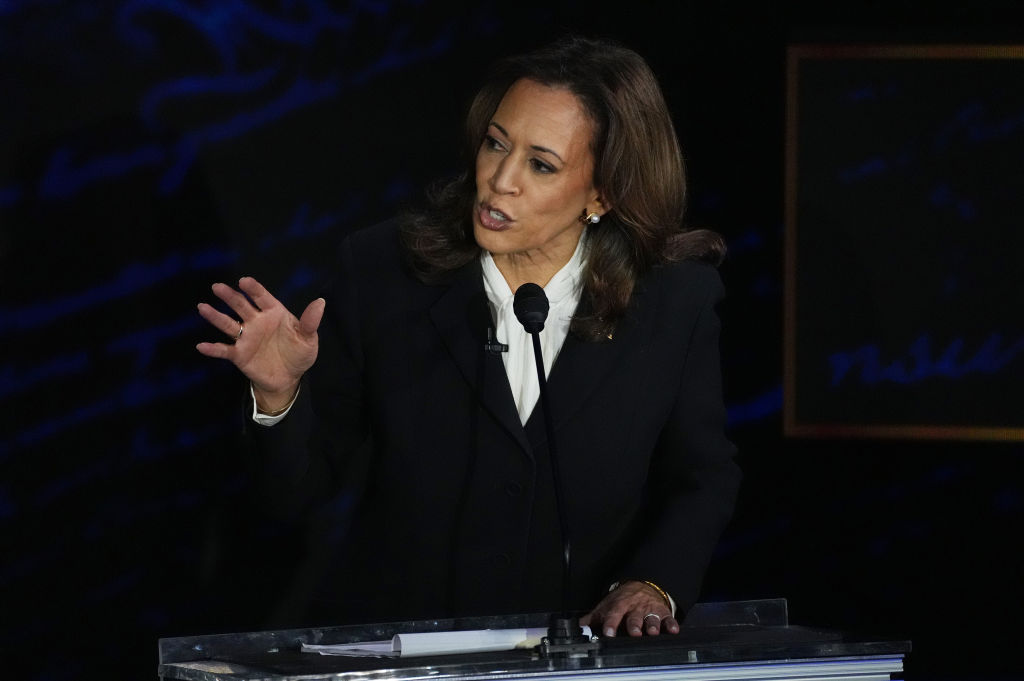Politics
For all the soaring rhetoric about “not going back,” Tuesday’s debate showed who the business-as-usual candidate is.

The ABC presidential debate between Donald Trump and Kamala Harris was just as clarifying as the debate between Trump and Joe Biden. Both debates have shown exactly what’s at stake in the election. The first showed the race to be between Trump and a man incapable of carrying on a conversation. The debate in Philadelphia has shown the race to be between Trump and a woman who represents the worst elements of the Washington, DC establishment, including the worst of the Republican Party.
This is an election that pits change, or at least disruption, against business as usual, and Harris, despite her slogans about moving forward, stands for the status quo. She is, of course, an extension of the incumbent administration—“She is Biden,” as Trump said—but she also harks back to the bipartisan consensus in favor of endless war that prevailed until 2016. Harris boasts of being the Dick Cheney candidate for 2024.
“I actually have the endorsement of 200 Republicans who have formerly worked with President Bush, Mitt Romney, and John McCain including the endorsement of former Vice President Dick Cheney and Congressmember Liz Cheney.”
Harris couldn’t make it any clearer that she is the candidate of both neoconservatism and neoliberalism. She offers nanny statism combined with crony capitalism—more mandates, more regulation, more green boondoggles, more Obamacare—but with some tax breaks for small businesses and much demagoguery about Trump’s tariffs. Harris wants to present herself as the free-market candidate, despite her record as the most left-wing member of the U.S. Senate during her time there and the partner in all the damage Biden has inflicted on the economy these past four years. She even unselfconsciously aligned herself with investment banking: “What Goldman Sachs has said is that Donald Trump’s plan would make the economy worse.”
Harris is explicitly running as the candidate of “going back” on abortion: back to the days of Roe v. Wade, when a liberal abortion policy was imposed everywhere. If pro-lifers balk at Trump’s federalist approach to the issue, they should consider how it compares to Harris’s promise of a nationally established right to abortion. Trump is no pure pro-lifer. But Harris is purely pro-abortion. Pressed by Trump and indeed the debate moderators to say whether she would impose any limits on abortion, even in the final months of pregnancy, Harris stoutly refused to endorse any restrictions whatsoever.
“Come on” was all the vice president said when Trump urged ABC’s Linsey Davis to get a straight answer—“You should ask, will she allow abortion in the eighth month, ninth month, seventh month?”
On topic after topic Trump was as blunt as ever, while Harris was a throwback to the banality of an earlier era. Without showing any appreciation for the irony, she said at one point, “Let’s talk about what is important in this race. It is important that we move forward, that we turn the page on this same old tired rhetoric.”
In contrast to such blatherskite, Trump was characteristically uninhibited. He shocked David Muir by telling the ABC anchor he was only being sarcastic whenever he said that he “came up a little short” in the 2020 contest; in fact, Trump still believes he won that election. Asked by Muir whether he regretted any of his actions on January 6, 2021, the former president turned the question around, defending rioters—“this group of people that have been treated so badly”—and invoking the memory of the woman killed while invading the Capitol. “Ashli Babbitt was shot by an out-of-control police officer that should have never, ever shot her. It’s a disgrace.”
Trump also defied the expectations of conventional politics by refusing to give a blandly reassuring answer to the question of whether he wanted Ukraine to win its war with Russia. Instead he simply said, “I want the war to stop,” and went on to lament the deaths of Ukrainians and Russians alike, while warning of the risk of nuclear escalation. “Don’t kid yourself, David,” he told the moderator. “We’re playing with World War III.” The figures Trump gave for the war’s casualties so far were implausibly high—no one could ever accuse the former president of understatement—but signaled just how appalling he found the conflict to be. He said he would end it before taking office again, if he won and could speak to Putin and Zelenskyy as president-elect.
The Republican’s biggest stumble, by traditional standards, came when he was asked whether he had a plan to replace Obamacare. A good slick politician is supposed to have a policy proposal for everything, even though virtually none of the policies that wonks dream up for their candidates has any chance of passing Congress. The “correct” answer for Trump to have given would have been technocratic babble promising everyone everything, without regard to political reality. That’s the stuff of which candidates’ platforms are made.
Trump didn’t bother to fake it. Instead, he gave a genuinely conservative answer: “If we can come up with a plan that’s going to cost our people, our population, less money and be better healthcare than Obamacare, then I would absolutely do it. But until then I’d run it [i.e., Obamacare] as good as it can be run.”
Imagine that—a politician saying that no, he has no magical solution for a problem and until he can come up with something clearly better, he’ll make the best of what already exists. A good ideologue is not supposed to say that, damn it; a good ideologue always knows exactly what needs to be done and is willing to change everything right now, or, as presidential aspirants now predictably say, “on day one.”
Harris made much of the fact that many former Trump officials oppose his re-election. Trump knew how to respond to that: “I fired most of those people. Not so graciously. They did bad things or a bad job. I fired them.” Now they were getting revenge by attacking him. Biden and Harris, on the other hand, “never fired one person. They didn’t fire anybody having to do with Afghanistan…. They should have fired all those generals, all those top people because that was one of the most incompetently handled situations anybody has ever seen.”
Subscribe Today
Get daily emails in your inbox
Do voters think more of Washington needs to be fired?
Or do they think that the same people should continue pursuing the same policies, with the same results America has seen under Biden and Harris and saw under Republicans like George W. Bush and Dick Cheney?
Higher immigration, more wars that can’t be won, fewer manufacturing jobs, and abortion without restriction anywhere—that’s what the old bipartisan elite wants, and if Kamala Harris wins, that’s what America will get.

